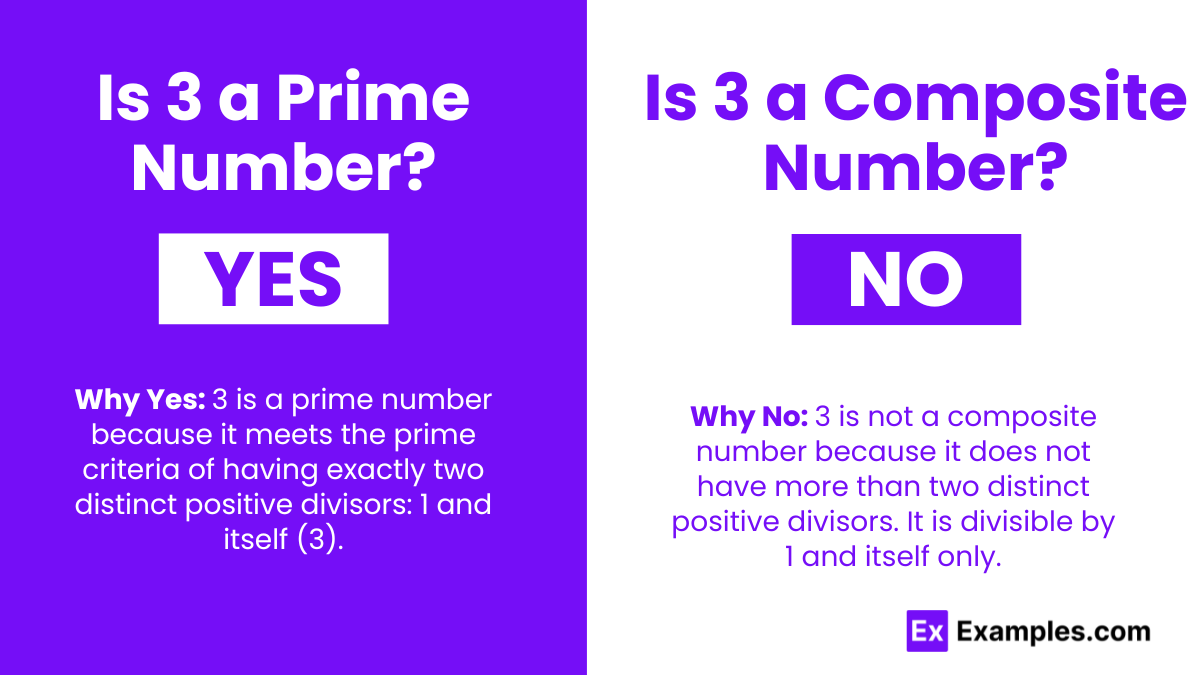What is the classification of the number 3?
Prime Number
Composite Number
Neither Prime nor Composite
Both Prime and Composite

Why Yes: 3 is a prime number because it meets the prime criteria of having exactly two distinct positive divisors: 1 and itself (3). See Prime number checker.
Why No: 3 is not a composite number because it does not have more than two distinct positive divisors. It is divisible by 1 and itself only.
| Property | Answer |
|---|---|
| Is 3 a prime number? | Yes |
| Is 3 a composite number? | No |
| Is 3 a perfect square? | No |
| Factors of 3 | 1, 3 |
| Multiples of 3 | 3, 6, 9, 12, 15, 18, 21, 24, 27, 30 |
| Cube Root of 3 | 1.442 |
| Square of 3 | 9 |
| Square Root of 3 | 1.732 |
| Is 3 a Perfect Cube? | No |
| Is 3 an Irrational number | No |
| Is 3 a Rational number | Yes |
| Is 3 a Real number | Yes |
| Is 3 an Integer | Yes |
| Is 3 a Natural number | Yes |
| Is 3 a Whole number | Yes |
| Is 3 an Even or odd number | Odd (3 is an odd number) |
| Is 3 an Ordinal number | Yes |
| Is 3 a Complex number | Yes (as all real numbers are complex) |
The factors of 3 are 1 and 3. 3 is a prime number because it is divisible only by 1 and itself, highlighting its prime nature.
3 is recognized as a prime number because it has exactly two distinct positive divisors: 1 and itself. 3 is one of the odd numbers; it is an odd number. 3 holds significance in various contexts, notably for its properties as a prime number. 3 is a natural number. 3 is a positive integer. 3 is predominantly discussed in the context of prime numbers. 3 is an odd number. 3 is a rational number. 3 is a whole number.
3, as a prime number, holds a distinct position in mathematics compared to composite numbers. Being divisible only by 1 and itself, 3 exemplifies the fundamental characteristics of primality. Its properties as an odd number, a prime, and a natural number make it a significant figure in various mathematical discussions.
The nearest prime numbers to 3 are 2 and 5. 2 is the closest prime number less than 3, and 5 is the closest prime number greater than 3
Text prompt
Add Tone
10 Examples of Public speaking
20 Examples of Gas lighting
What is the classification of the number 3?
Prime Number
Composite Number
Neither Prime nor Composite
Both Prime and Composite
Which category does the number 3 belong to?
Prime
Composite
Complex
Natural
Is the number 3 a composite number?
Yes
No
Maybe
Only in some cases
What type of number is 3?
Prime
Composite
Prime and Composite
Neither
Which of the following describes the number 3?
Prime Number
Composite Number
Neither Prime Nor Composite
Both Prime and Composite
Which of the following statements is true about the number 3?
It has more than two divisors
It is only divisible by 1 and itself.
It is a composite number
It has exactly three divisors
Determine the nature of the number 3 based on the following property: A number is prime if it has exactly two distinct positive divisors.
Composite
Neither Prime nor Composite
Prime
Complex
Which of the following is a characteristic of a prime number?
It can be divided by 1 and multiple other numbers.
It has exactly two positive divisors.
It is always an even number.
It has no divisors.
The number 3 is classified as:
Composite because it has more than two factors.
Prime because it has exactly two factors.
Neither because it is too small.
Composite because it is an odd number.
How would you classify a number that can only be divided by 1 and itself without leaving a remainder?
Composite
Prime
Even
Odd
Before you leave, take our quick quiz to enhance your learning!

